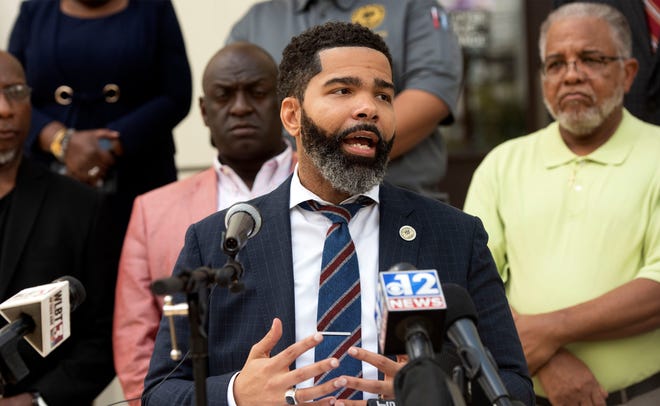Groups across Mississippi rallied Wednesday to support Jackson in beating the sweltering August heat amid the city’s ongoing water crisis, and the federal government is also lending a hand.
Mayor Chokwe Antar Lumumba said at an afternoon news briefing that he had received a pledge of support from President Joe Biden, who the previous night approved Mississippi’s emergency declaration, freeing up federal resources to bolster the state’s response.
Lumumba said both Biden and Vice President Kamala Harris “assured me that the eyes of Washington are watching the city of Jackson,” and that their commitment to solve the water crisis extends beyond the immediate needs and toward finding a long-range solution.
White House Press Secretary Karine Jean-Pierre said the Environmental Protection Agency would send an expert to Jackson to assess its water treatment plants and expedite repairs.
As the Mississippi Emergency Management Agency and National Guard worked to get drinkable and non-drinking water to more than 150,000 Jackson residents throughout the week, other local organizations stepped in to help.
On an “uncomfortably humid” day when temperatures were expected to reach 92 degrees, according to AccuWeather, YMCAs across the city offered free showers to local college students, WAPT-TV reported.
Excessive rainfall had doused Jackson and central Mississippi throughout August, and recent flooding on the Pearl River caused pumps to fail at a Jackson water treatment plant, officials said.
Here’s what to know about the response to Jackson’s water shortage and who’s impacted:
Water from the faucets still not drinkable
Lumumba said residents of the capital city still need to boil water for drinking, washing dishes and other activities, like brushing their teeth.
An emergency pump was installed Wednesday at the O.B. Curtis Water Treatment Plant to restore water pressure, and Lumumba said city dwellers should notice improvement in that regard by Wednesday evening. But tests Tuesday night showed issues with the water chemistry, leading to a drop in output and water pressure, and a requirement to boil water for certain uses remained in effect.
“It is safe to take baths in. It is safe to wash your hands,” Lumumba said. “However, if you are drinking or cooking with it, we ask you to boil that water (for at least a minute).”
Even before the service disruption, Jackson residents had been boiling their drinking water for the past month because officials said it could cause digestive problems.
Who is helping Jackson residents access drinkable water?
Jackson’s residents will receive help from coastal Mississippi, thanks to efforts from Ocean Springs-based restaurant founder Brad Orrison.
Orrison, who runs the Shed BBQ and Blues Joint and a barbecue sauce company, planned to fill 8,000 12-ounce water bottles to send to the state’s capital with the help of anyone who’s available to transport the load upstate, he told the Sun Herald of Biloxi, Mississippi.
BIDEN APPROVES EMERGENCY DECLARATION:Mississippi pump failure leaves 150K people without safe drinking water
The businessman and his family lived through Hurricane Katrina 17 years ago and recalled going without water, the Sun Herald reported. “It’s an unfortunate thing, but we are doing the best we can to try and help,” Orrison said, according to the Sun Herald.
Local Jackson organizations like the Immigrant Alliance For Justice And Equity and New Horizon Ministries also planned to distribute water to residents. The Mississippi Food Network, the only food bank in the state, announced a collaboration with Feeding America to get water bottles to people in Jackson.
How is the water crisis impacting Jackson’s communities of color?
The people of Jackson, where more than 80% of the residents are Black, were first told to boil their water in July after the health department discovered cloudy water that could cause health problems.
Lead worries and a cold snap last year left residents without water for weeks. Experts say chronic neglect of the city’s aging water infrastructure reflects how Black and brown communities are hit hardest by underinvestment.
‘IT’S SHAMEFUL’:Flooding broke open Jackson’s water crisis but it can’t be disentangled from race
How much could it cost to solve the water crisis?
The financial impact of the state capital’s ongoing water issues could reach “billions of dollars,” Lumumba said Tuesday. “That is far beyond the city of Jackson’s reach to be able to accomplish that on our own.”
At a news conference Wednesday, Lumumba said President Joe Biden told him the federal government is willing to help find a long-term solution.
Jackson has committed “every dollar we could find in order to meet this challenge,” Lumumba said, including $8 million to cover the cost of a single 48-inch water line that supports service to the “most disproportionally affected” area of south Jackson. Lumumba said he has discussed splitting the cost of addressing the crisis with health department leaders and the Mississippi Emergency Management Agency, who mentioned taking on about half the cost.
The city plans to use funds from the American Rescue Plan to meet its portion of the costs, according to Lumumba.
Contributing: The Associated Press


